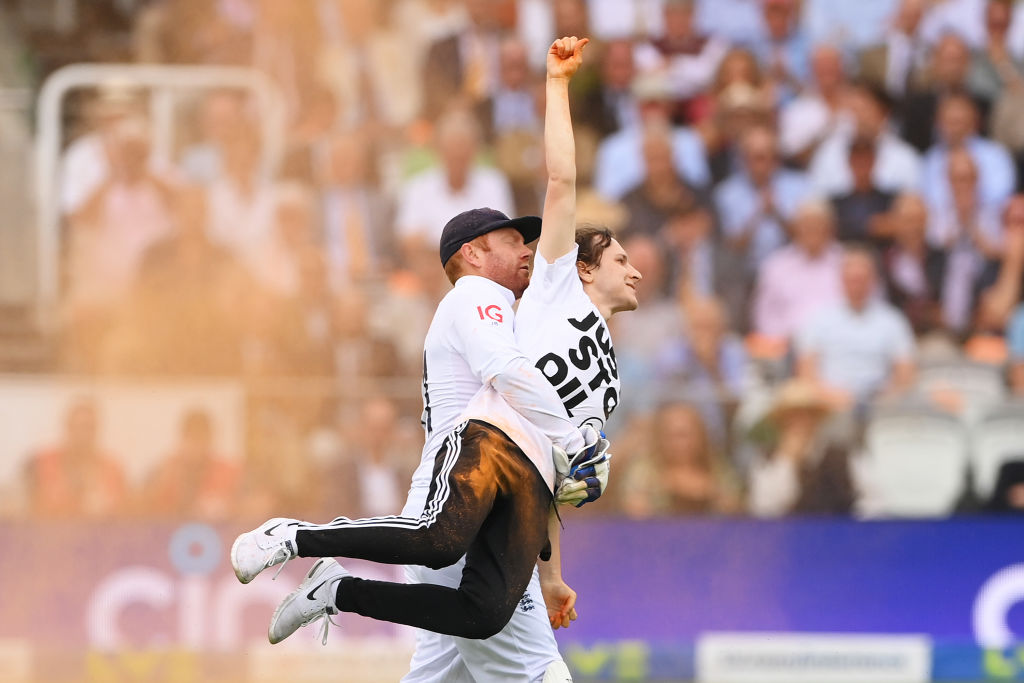Lessons for sponsors from sport’s biggest summer of protests since the suffragettes

Sport sponsors need to be clear on what they stand for – not just what they stand next to – if they are to avoid blowback from protests, says marketing expert Matt Readman.
This has been the most disrupted summer of sport for over a century. The pitches, courses and tracks of the UK now host a new game, as climate protestors try to side-step the lunges of stewards, all to the pantomime booing of a frustrated crowd.
In some ways it’s surprising it has taken Just Stop Oil and others so long to target sport.
Hanging from a gantry on the M25 is perilous. It also unfairly affects hard-working commuters and isn’t even that visible. In contrast, interrupting major sporting events is relatively safe – unless you run into Jonny Bairstow – and it doesn’t disturb long-awaited hospital appointments.
Sports arenas also have infinitely more power to garner attention. In fact, live sport is one of the last places where society’s collective energy is focused on the same thing at the same time. Sport is therefore the perfect stage to make a scene.
This summer, as the police struggles to define a strategy to cope, protesters have made hay while the sun shines. We have seen disruption at pretty much every marquee sporting event, from the Ashes to the Open. This is by no means the first time sport has encountered protest, but rarely have we seen it on this scale or with this persistence.
You have to go back 110 years to find anything comparable. Between 1912 and 1914 the Women’s Social and Political Union launched a string of devastating attacks in the fight for women’s suffrage.
In the summer of 1913 these included not just the death of Emily Davison at Epsom, but attempted arson attacks at the FA Cup Final and Wimbledon, not to mention targeted action at hundreds of private golf courses and other sporting clubs.
The suffragettes chose sport not just because it created attention, but because it was perceived as a male domain. There is a similar duality to the thinking this summer too.
Climate protests also target sport because it can be a major contributor to the crisis. This doesn’t just include the events themselves but those who sponsor them.
The protests at Wimbledon and the Cycling World Championships were attributed directly to the involvement of Barclays and Ineos respectively. This should be a wake-up call to all brands involved in sport.
When crowds are cheering and laughing as protestors are evicted it’s easy for sponsors to think they are on the right side of the debate, but they can’t afford to become complacent. Whilst it’s only natural for high-paying fans to be frustrated, it shouldn’t be mistaken for broader society thinking that way and it certainly isn’t how history will judge these years.
The suffragette movement couldn’t have been less popular in 1913, yet history of course remembers things differently. Climate change is our great social struggle. Future generations will almost certainly see those wearing orange as the heroes.
How brands which sponsor sport can protest themselves from protests
The first thing sponsors should do therefore is to make sure they themselves aren’t vulnerable to an attack. It’s one thing sponsoring a sporting event that is targeted; it’s quite another being the target yourself. It’s advisable not to go into any major sporting sponsorships unless your own carbon footprint is dainty to say the least.
The second thing sponsors should get straight is why they are entering into the partnership. When you officially tie yourself to a sporting event, your brand is in the hands of others – not just the event organisers, but now those who wish to hijack it too.
The antidote to this is purpose and clarity. If a sponsor is clear what it stands for – not just what it stands next to – it is far more protected. It retains control of the narrative. When the inevitable protest happens it can be sympathetic but also clear on why it is there and what it believes in. If it is using a sports sponsorship as a badging exercise, it will be up to the viewer what story they take out of it.
We are in a key period in the fight to reverse climate change. As economic hardship hits and resolve begins to falter, it would be easy for brands to swat away the significance of these protests. In truth, this is the social fight that will define our generation.
Sport, and therefore sponsors, have been thrust into the heart of it. Brands need to think very carefully about how they react. It’s no longer safe to put your company name in the limelight without having a clear reason for doing so. If you’re in it for the attention alone, you might get more than you bargained for.
Matt Readman is chief strategy officer at creative agency Dark Horses.